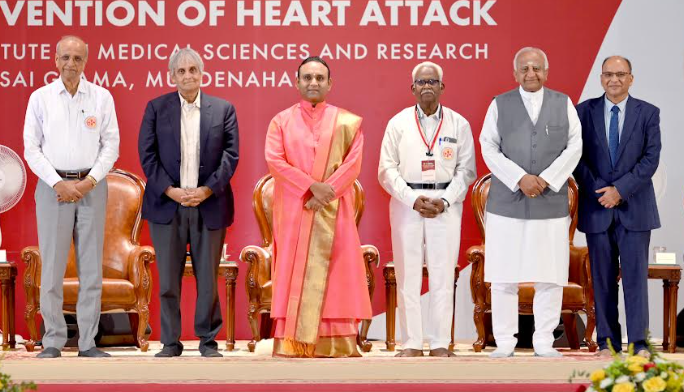Save the Young Heart Conference – SMSIMSR’s Awareness Endeavour for Early Detection and Prevention of Heart Attacks in Young Adults

Sathya Sai Grama, Muddenahalli , 21 July 2025 – The devastating crisis unfolding in Karnataka where youth in their 20s – 40s are succumbing to sudden episodes of cardiac attacks reinstates that “preventive and curative healthcare is the way to go”.
Healthcare and Cardiac care veterans cite awareness about such occurrences, watching out for the tell-tale signs of impending cardiac attacks and taking preventive and precautionary measures are key to containing this crisis.
As a strategic endeavour to foster awareness on early detection and prevention of heart attacks in young adults, Sri Madhusudan Sai Institute of Medical Sciences and Research (SMSIMSR) organised the Save the Young Heart Conference on 18 – 19 July 2025 that brought together Cardiac care veterans, young healthcare professionals, wellness coaches, educators, tech giants, innovators and corporates and HR heads promoting workplace health.
The key themes of the conference are prevention of heart attack in young adults, role of diet and lifestyle in cardiac health, and practical tools for managing stress and emotions. The conference also emphasised on emergency CPR training, the significance of heart health screenings and insights into free cardiac care initiatives.
The inaugural session was presided by Dr Balakrishnan, eminent cardiothoracic and transplant surgeon; Sri B N Narasimha Murthy, Chief Mentor at the Sri Sathya Sai Loka Seva Gurukulam Group of Institutions; Dr Annarao Kulkarni, President of the IAPSM Karnataka State Chapter; Dr Raghupathi A R, Director – Liaison & Strategic Growth SMSIMSR; and Sri Madhusudan Sai, Founder CEO, SMSIMSR.
Dr Anand Agarwal, Head of Cardiothoracic and Vascular Surgery at SMSIMSR, and the Founder of the Save the Young Heart Foundation, shared his deep concern about the alarming rise in heart conditions among youth. Elaborating on the journey of the Save the Young Heart initiative, Dr Agarwal emphasised the role of emotional stress in causing vascular inflammation, leading to blockages. He added: Lack of sleep, irregular eating habits, and inadequate sunlight exposure are silent enemies of young hearts. In a proactive move, Dr Agarwal announced the launch of a Heart Risk Assessment Tool based on the Interheart Risk Score, which will help users categorise their heart risk as low, moderate, or high.
Dr Annarao Kulkarni, President of IAPSM Karnataka, called the conference “not just relevant but absolutely essential” amid rising heart disease among youth. Quoting Dr Robert Lustig, he warned, “Processed foods are slow poison,” and urged moderation, yoga, and spiritual detachment as key to prevention.
Dr Balakrishnan presented a data-driven and compelling case for early intervention. Stating that fatal heart attacks often stem from non-obstructive plaques that go undetected. He acknowledged systemic challenges: “We all talk about exercise, but the reality is, If you’re working 16 hours, 12 hours a day in the middle of a city, there’s very little space to walk,” highlighting the need for holistic public health policies.
Sri Madhusudan Sai, Founder and CEO of SMSIMSR, opened his address with a prayer: “May all be happy, may all be healthy, may no one have any sorrow, may all see good and auspicious things everywhere,” emphasising that achieving this vision requires a collective and disciplined effort. Referring to the Save the Young Heart campaign as “an idea whose time has come,” he called for moderation in lifestyle, consistent self-discipline, and greater awareness. Highlighting the economic burden of heart disease, he pointed to the urgent need for affordable and scalable preventive healthcare solutions, including wearable tech and community-based clinics offering diagnostics and medications free of charge.
He stressed that “health is wealth” and said India’s future growth depends on a healthy population. Drawing on traditional wisdom, Sri Madhusudan emphasised avoiding the “Six S’s” – salt, sugar, spirit, smoking, stress, and sedentary lifestyle – while promoting yoga, spirituality, and mental well-being.
The conference concluded with a shared commitment to drive awareness, prevention, and early intervention for heart health in youth. With collective action, disciplined living, and scalable solutions, a healthier future for India’s young hearts is within reach.

